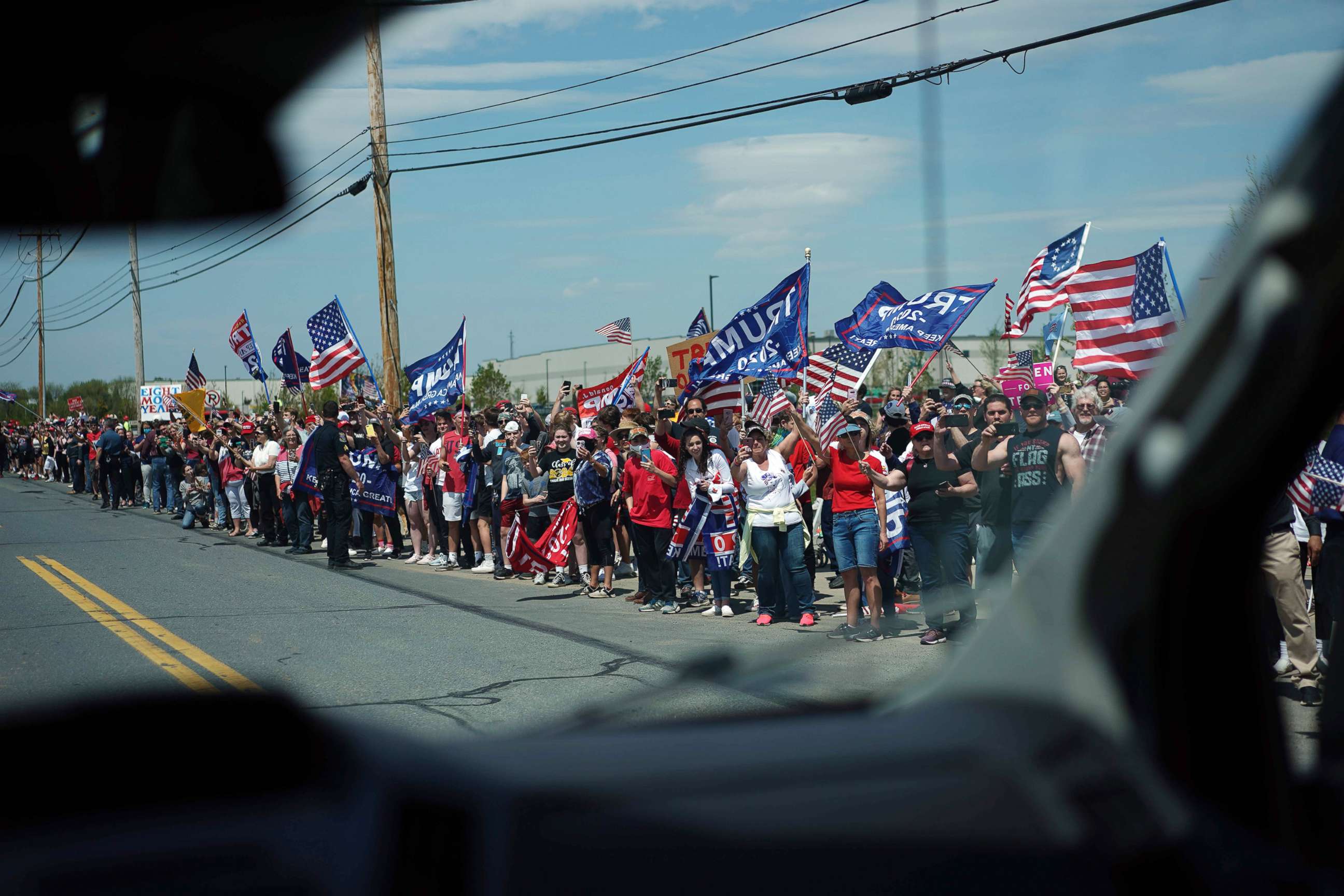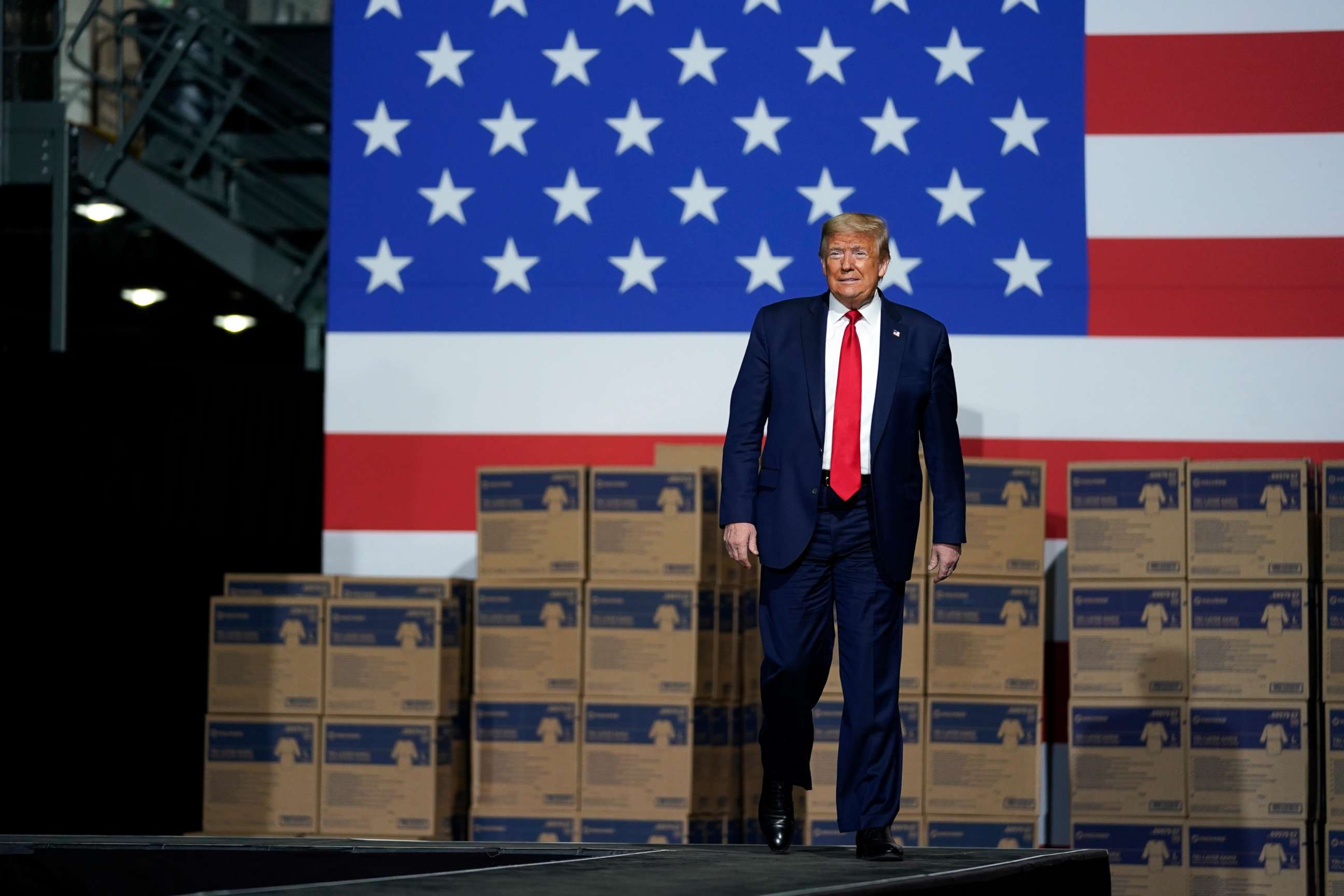Trump targets battleground states with taxpayer-funded events as campaign rallies remain on hold
Trump plans to travel to Michigan this week, his third swing-state trip in May.
With his signature campaign rallies on hold, the centerpiece of his re-election strategy, President Donald Trump and his administration have predominantly targeted traveling to battleground states amid the coronavirus, raising concerns from critics who say the president is campaigning on taxpayers’ dime.
After nearly two months confined to the White House, the president in early May started traveling again around the country while pushing states to re-open amid the coronavirus pandemic.
In early May Trump traveled to an Arizona factory producing respirator masks before heading back out last week for an event in Allentown, Pennsylvania.
This week, Trump will take another official White House trip to a battleground state on Thursday when he heads to a Ford plant that in Michigan that is manufacturing ventilators — marking third trip and third event this month alone in states that his campaign has deemed crucial to his re-election.
Along with Vice President Mike Pence’s official travel, the Trump White House has taken taxpayer-funded trips to Pennsylvania, Arizona, Virginia, Minnesota, Wisconsin, Iowa and now planned visits to Michigan and Florida this week in an continued effort to highlight the administration’s coronavirus response while urging states to reopen.
The events in Arizona and Pennsylvania that featured the president mirrored campaign rallies in both presentation and ability to generate wide-spread local media attention around the present’s visit—a key factor in holding rallies, according to aides.
Last Thursday, Trump toured an Allentown, Pa. medical equipment distribution company and delivered remarks in front of a few dozen workers, thanking them for deploying millions of respirators, gowns, and gloves across the nation. "I want to thank you, because you're making America proud," Trump said.

At the event, the president walked on stage to Lee Greenwood’s “God Bless The U.S.A.” He praised the workers in the crowd who were wearing red “MAGA” campaign hats.
He attacked his political opponent presumptive Democratic presidential nominee Joe Biden over a recent gaffe.
He pointed out the press pen in the back of the event and chastised them for being “a disgrace.”
And he left the stage to “You Can’t Always Get What You Want” by the Rolling Stones, just like any campaign rally.
At one point, one of the workers in attendance pulled up their shirt to reveal another shirt with a large Q, seemingly a reference to the far-right QAnon conspiracy theory that's popular at Trump rallies which baselessly posits that a high-ranking government official known only as “Q” has been leaking government secrets online.
Others danced to the signature rally playlist blaring over the PA ahead of the event.
Hundreds of supporters, many waving Trump 2020 signs and flags, lined the streets in Allentown waiting for the president’s arrival at the Owens & Minor, Inc. Distribution Center—another scene that could have been stripped from a campaign event prior to the coronavirus.
"You had to see the crowds coming from the plane,” the president said in an interview after the event, boasting about the size of the crowd waiting from him, something the present hasn’t really been able to do since his last rally in North Carolina on March 2nd. “That's your poll,” Trump said.

Trump's critics have ripped the recent events as de-facto campaign rallies, including Joe Lockhart, former White House press secretary under President Bill Clinton, who wrote on Twitter following the Arizona stop criticizing the administration's response to the virus while spending "plenty of taxpayer money to put on a campaign event."
But the similarities between an average campaign rallies and recent White House events go beyond advance staff blasting Trump’s sing-a-long rally playlist, or the president taking shots at Biden at official events.
The events were opportunities for the president to make his case for re-election to voters in states that will decide whether he will get a second term, especially through earned local media. Trump’s ever aggressive team worked to capitalize on the two taxpayer funded trips to generate local media attention and to promote the administration’s coronavirus response in states the campaign needs to win in November.
"Americans can see that President Trump is fighting to protect their safety and reopen the economy. He is doing his job as President and critics would complain if he didn’t go," Trump campaign communications director Tim Murtaugh said in a statement to ABC News. "They are the ones playing politics."
Ahead of the event in Allentown, the Trump campaign deployed two big-name surrogates for local interviews promoting the president’s trip. Former 2016 campaign manager Corey Lewandowski and Republican National Chairwoman Ronna McDaniel, who both did local radio spots on Thursday.
And following each trip to Arizona and Pennsylvania, the White House boasted publicly on Twitter about how much local media attention the tax-payer funded events had garnered in the swing states.
“What Pennsylvania is reading,” Deputy White House Press Secretary Judd Deere tweeted out on Friday along with imaged of local Pennsylvania papers with one headline that read, “‘We’re going to vanquish the virus.’” Deere tweeted out similar local headlines following the president’s trip to Arizona.
“These are official events fully executed from beginning to end by the White House with no involvement or coordination with the campaign,” Deputy White House press secretary Judd Deere said in a statement when asked if the official event were serving in place of campaign rallies.
While the campaign or White House press teams working to create press during an election year isn’t a foreign concept, Trump has repeatedly faced criticism from those claiming he has further blurred the lines between official events and campaign rallies.
“Everything is part of the campaign,” historian at Princeton University and author of "Burning Down the House" Julian E. Zelizer tells ABC News when asked about the recent White House events. “That is how the president has always thought about his tenure. Through much of pandemic, it has been impossible to distinguish his role as president from his role of candidate."
“He is trying to take advantage of the moment when his opponent can't leave the house,” Zelizer said.
Local press attention played a core role in Trump’s rally strategy, which has been hampered amid the pandemic as in-person campaigning has remained on hold for nearly three months now. Regardless if Trump dropped into a state ahead of a special election or to rip local headlines away from Democrats holding a primary— the president’s massive rallies generated an explosion of local media coverage and often pushed narratives the campaign wanted to highlight in key states— and all by design.
Trump’s team had developed a strategy to extend the impact of the president’s rallies into week-long local media blitzes prior to the pandemic changing the 2020 landscape.
The campaign’s plan was to first generate local press with the initial rally announcement. Then they’d send surrogates to make news in the days leading up to the event before campaign communications staff arrived in the market the day before for rounds of local media. Trump would make headlines at the rally itself, and for the last few, the campaign had even started turning rallies into local TV ads they’d run in the days after the event.
“No one else can make a single rally last for almost two weeks in a market,” a senior Trump campaign official said.
Now, Trump’s two recent taxpayer funded trips have produced similar results in terms grabbing both national and local press coverage in key battleground states as the president works to tout his coronavirus response amid sliding polling numbers.
Trump campaign officials have discussed ways to bring rallies back amid the pandemic, looking at holding them in areas of the country deemed to be low risk and ways to implement social distancing guidelines, sources tell ABC News. In the meantime, the president looks to continue to hit the road in key states touting his administration's response to the pandemic that's now killed over 90,000 Americans and decimated the economy, leaving 36 million claiming unemployment.
Trump isn’t the first president to push the limits of campaigning while president, and leading the country amid a crisis like the coronavirus complicates things even more, according to Thomas Patterson, Bradlee professor of Government and the Press at Harvard University’s Kennedy School of Government.
“Technically presidents are supposed to reimburse the government when they travel for campaign and political purposes but it’s long been a grey area when a president mixes official business with politics,” Patterson said.
“Trump wouldn’t be the first president to stretch that limit. Nevertheless, it’s traditional for a president to make public appearances outside of Washington during a crisis, so Trump probably gets a pass for now.”
"The issue is whether, like so many other things, he pushes the limit beyond reason in the coming months,” Patterson added.
And according to Zelizer, it's the "scale and scope" of the president using official events to make his re-election pitch that distinguishes him from past presidents. "The president doesn't allow for almost any non political space. He is constantly thinking about what he needs to do to maintain his power and he simply doesn't exhibit the concern with governance that other presidents--in both parties--have shown."
In the weeks prior to the president’s trips to Arizona and Pennsylvania, Vice President Mike Pence, who before being picked to lead the White House coronavirus task forced had been hitting the campaign trail hard with bus tours in Michigan, Wisconsin and Pennsylvania, has also focused amid the pandemic on traveling to states that could decide the 2020 election.
Pence’s official travel consisted of stops in a number of 2020 swing states states, including Colorado, Florida, Wisconsin, Minnesota and Virginia. Some of the vice president's travel recently has been to non-swing states including to his homestate of Indiana.
Trump faced similar criticism a few weeks back while holding daily White House coronavirus press briefings that often stirred into political attacks and lasted hours long.
The president bragged about the ratings the briefings would generate, but has since shifted to holding less-regularly press briefings host by new White House press secretary Kayleigh McEnany.
ABC News' Ben Gittleson contributed to this report.




